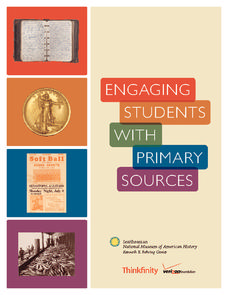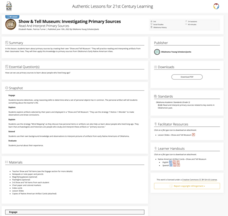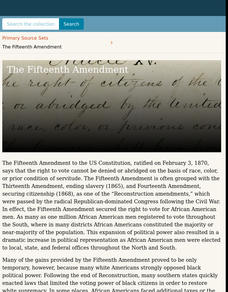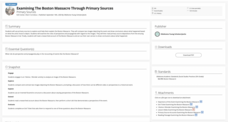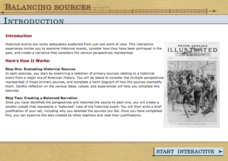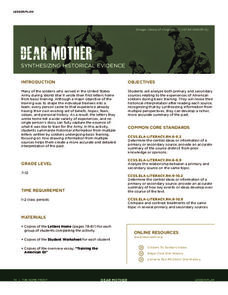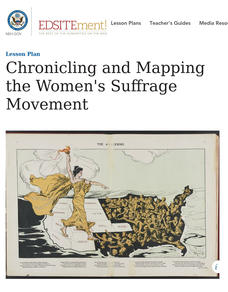Smithsonian Institution
Engaging Students with Primary Source
Young historians learn how to analyze various forms of primary source documents. The colorful packet is packed with all you need to engage kids in this essential skill.
Civil War Trust
Civil War Photography: Photography as a Primary Source
Can we learn a thing or two about history by looking at pictures from the past? As young historians view 2-D and 3-D primary source photographs, they respond to a series of worksheets that guides them toward unveiling clues...
PBS
Using Primary Sources: Wide Open Town
A picture speaks a thousand words, no matter how old! Scholars use political cartoons from the era of Prohibition and the Temperance Movement to analyze what, a primary document (in this case, a bootlegger's notebook) is telling them...
Historic New Orleans Collection
Exploring Primary Sources: Music in New Orleans
Looking for a new and exciting way to teach young historians the art of primary source analysis? Jazz up your lesson with a resource that asks class members to analyze photos, travel documents, and letters written by some of New Orleans'...
PBS
Using Primary Sources: The Rogue's Gallery
What would be in your life's scrapbook? Scholars use short video clips, primary and secondary documents, and photos to investigate a 1909 scrapbook. They analyze and uncover what the Rogue Book tells them about the past in Western...
Briscoe Center for American History
Identifying Primary Source Documents
Who is Mary Maverick and why is she important? the focus of this, the second in a series of five lessons that are designed to introduce middle schoolers to how historians use primary source documents to understand the past, is on...
PBS
Using Primary Sources: Nazi Spy Ring Busted
Spy games are not just for professionals anymore! Scholars use short video clips, primary documents, and photographs to investigate Nazi spies in America during World War II. The young detectives analyze the paranoia warfare can...
Digital Public Library of America
Ida B. Wells and Anti-Lynching Activism
A packet of 13 primary sources provides young historians with insight into the anti-lynching activism of civil rights Ida B. Wells. Included are images of Wells, her letters, a political cartoon, newspaper lynching announcements, and a...
K20 LEARN
Show and Tell Museum - Investigating Primary Sources: Read and Interpret Primary Sources
Scholars become detectives in a lesson that focuses on primary sources. Learners practice their observational skills by examining the teacher's artifact and visiting the Show and Tell Museum that highlihgts items from peers and...
Digital Public Library of America
The Fifteenth Amendment
Fifteen primary sources provide a context for a study of the Fifteenth Amendment to the United States Constitution. The packet captures the excitement for the changes promised by the amendment as well as the backlash against it.
K20 LEARN
Examining The Boston Massacre Through Primary Sources
The Boston Massacre is the focus of a lesson that explores primary sources. Scholars examine two primary source images and discuss the different perspectives on the historical event. After groups read a researched account, they perform a...
EngageNY
Mid-Unit Assessment: Classifying and Evaluating Primary Sources
Let's take a walk—a gallery walk. Scholars complete a mid-unit assessment relating to Unbroken by taking a gallery walk to view the various primary source mediums. They then use organizers to select three sources and respond to...
EngageNY
Mid-Unit Assessment: Classifying and Evaluating Primary Sources
Let's go for a walk. Learners complete the mid-unit assessment by completing a gallery walk to analyze different primary sources discussed while reading A Mighty Long Way. After viewing the sources, class members complete organizers and...
Anti-Defamation League
Analyzing Primary Source Documents to Understand U.S. Expansionism and 19th Century U.S.-Indian Relations
Historical events can be viewed from multiple perspectives. This simple truth is brought home in a lesson plan that examines primary source documents related to the Lewis and Clark Expedition, the Doctrine of Discovery and Manifest...
Syracuse University
Civil War
What was it like to enlist as a soldier in the Civil War? By using enlistment papers, young scholars consider this question. After they've looked at the primary source and discussed it, they create a short story of a fictional soldier to...
Annenberg Foundation
Balancing Sources
Pupils turn into investigative reporters throughout history to learn what it takes to balance different primary sources on the same topic. They use what they learn to create a narrative based on their own interpretation of a historic...
Center for History Education
How Did the Public View Women’s Contributions to the Revolutionary War Effort?
Calling upon the legacies of Joan of Arc, Elizabeth I, and Catherine the Great, Esther Reed rallied Southern women to support the American Revolution. Using a broadside by Reed and other primary sources, such as poetry, young historians...
Historical Thinking Matters
Rosa Parks: 5 Day Lesson
What led to the success of the Montgomery Bus Boycott, and how might historians approach this question differently? This rich series of lessons includes a short introductory video clip, analysis of six primary source documents, and...
National WWII Museum
Dear Mother: Synthesizing Historical Evidence
It's one thing to read history, it's another to live it. Pupils examine secondary and primary sources that detail the training of soldiers before deployment. Then, they consider the impact of primary sources on how they understand the...
Library of Congress
The Harlem Renaissance
The Harlem Renaissance brought forth many American art forms including jazz, and the writings of Zora Neale Hurston and Langston Hughes. Using a carefully curated set of documents from the Library of Congress, pupils see the cultural...
National Endowment for the Humanities
Chronicling and Mapping the Women's Suffrage Movement
While women's suffrage is often believed to be the result of a single constitutional amendment, the effort of women to secure the vote spanned decades and continents. Using primary sources in online archives, class members explore the...
Elizabeth Murray Project
Gender and Opportunity in Colonial America
What was life like for women in Colonial America? What restrictions were placed upon them and what opportunities were they afforded? A case study of Elizabeth Murray offers high schoolers a chance to investigate primary source...
K20 LEARN
Whose Manifest Destiny? Westward Expansion
Your land is my land! Young historians investigate the concept of Manifest Destiny used by the United States government to justify western expansion. Jigsaw groups read primary source documents to gain an understanding of the movement...
National Endowment for the Humanities
Lesson 2: The United States, France, and the Problem of Neutrality, 1796–1801
While the French Revolution could be considered inspired by the American Revolution, it created thorny problems for the new United States. Should the United States get involved and be drawn into a European drama? Was the US strong...
Other popular searches
- Primary Source Documents
- Using Primary Sources
- Primary Source Analysis
- Wwi, Primary Sources
- Rosa Parks Primary Documents
- Gilded Age Primary Sources
- Working With Primary Sources
- Primary Resources Hsie
- Web Quests Primary Sources
- Ancient Rome Primary Sources
- 1920 1929 Primary Sources
- Primary Sources and Family
